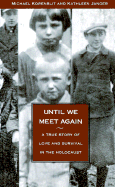
A True Story of Love and Survival in the Holocaust
This was a really good nonfiction book. It reads just like a novel. Most holocaust stories are really depressing, but this one even though it has some really sad parts and the characters have to go through so many struggles, their love for each other lightens up the story a little. it shows how even though you may be all alone memories can keep you going. it even has a happy ending. If you have to read a nonfiction book for school I definitely recommend this book. What happened to the Jewish people was horrible, and i had never really read anything that detailed what they went through like this book.
Review/Description
In 1942, Korenblit's parents, Manya and Meyer, were teenagers in love in Hrubieszow, Poland. But they were also Jewish and soon found themselves torn from their families and each other as they were shifted from camp to camp. Before they were separated, though, the two promised to meet in their hometown at the end of the war, which they did--two of the fewer than 200 surviving members of the 8000-strong Jewish community that had lived in Hrubieszow before the war. The writing here just is not as powerful as the facts, however. One strategic choice depletes much of the suspense: Korenblit reveals in an introduction that while researching the book, he discovered one of his mother's brothers living in England. It's a fantastic detail, initially well told, but by the end, when it is repeated, it sounds pedestrian. Other techniques lessen dramatic effect. For example: while in the camps, Manya kept an ersatz diary, jotting down daily events in terse lists such as ``Cyvia, joy, horrible condition, no hair, Cyvia better, new friend, replaced shoe, washed dress, farmwork'' which she rolled into tight cylinders and concealed in her hair. Rather than relying on the lucidity of those original notes, Korenblit and Janger imagine what Manya would have written had she had the paper and the time.